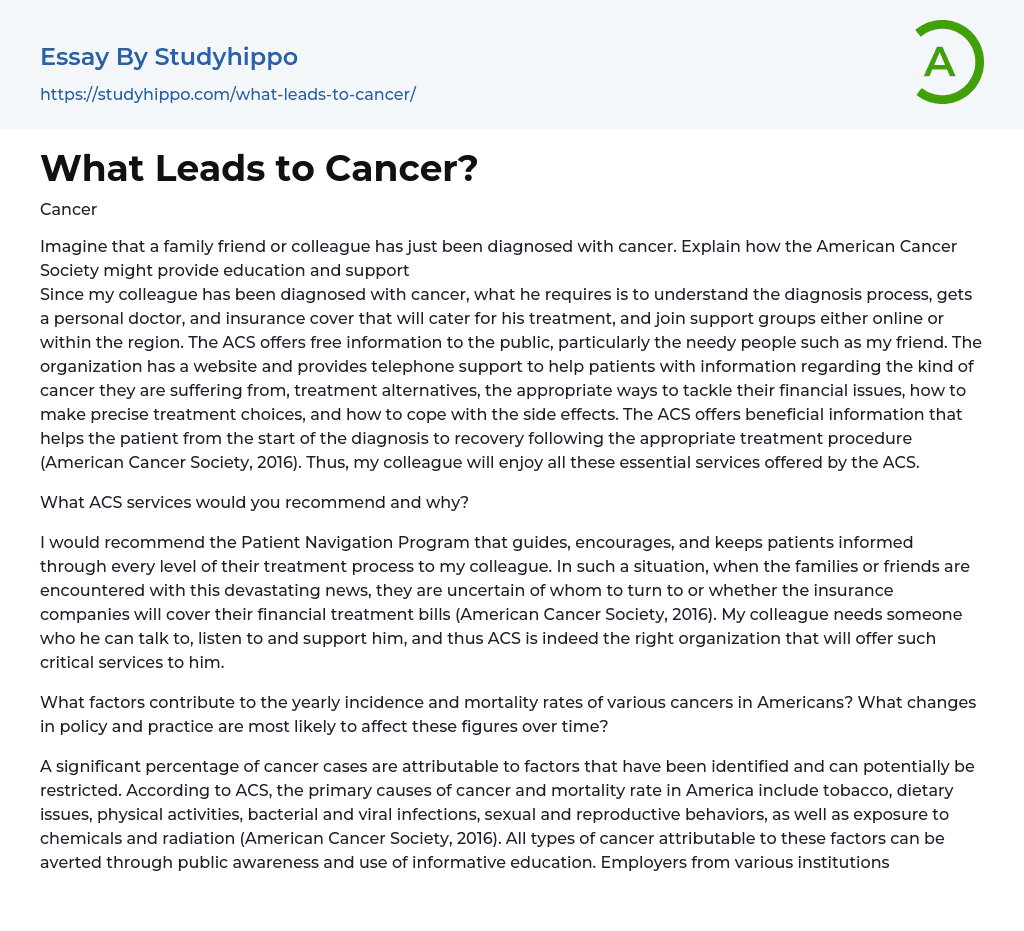Cancer
The American Cancer Society (ACS) provides assistance for individuals with a cancer diagnosis. They offer education and support, helping patients comprehend the diagnosis process, locate a personal doctor, and secure insurance coverage for treatment. Additionally, the ACS has online and local community support groups accessible. Their website furnishes free information and telephone support to aid patients in understanding their specific type of cancer, exploring treatment options, addressing financial concerns, making informed treatment decisions, and managing treatment side effects.
The American Cancer Society (ACS) offers essential resources and support to patients during their diagnosis and recovery. It is advisable for my colleague to utilize ACS's wide array of services, including the Patient Navigation Program. This program provides valuable aid by offering guidance, encouragement, and regular updates throughout the treatment process. It
...is especially beneficial for individuals whose loved ones are unsure about where to seek assistance or if insurance will cover medical costs (American Cancer Society, 2016).
ACS is the appropriate organization to provide essential services to my colleague in terms of offering someone to talk to, listen to, and support him. It is important to consider the factors that contribute to the annual incidence and mortality rates of various cancers among Americans. Furthermore, it is crucial to assess the potential impact of policy and practice changes on these statistics over time.
A significant portion of cancer cases can be attributed to identifiable factors that have the potential for limitation. According to ACS, tobacco use, dietary issues, physical activity levels, bacterial and viral infections, sexual and reproductive behaviors, as well as exposure to chemicals and radiation are primary causes of cancer and mortality rates in America (American Cancer Society,
2016). To prevent all types of cancer associated with these factors, there should be promotion of public awareness campaigns and informative education.
Employers can motivate people by providing them with information on the dangers of various things they use, aiming to decrease these risks significantly. For example, hospitals offer a $600 discount on insurance deductibles to patients who undergo prescreening for smoking, physical activity, and obesity. Moreover, individuals need proper education about inherited risk factors and a comprehensive understanding of the carcinogens they encounter during leisure activities. It is crucial for healthcare providers to support patients by equipping them with vital information (In Ignatavicius, 2015).
Furthermore, it is crucial for medical institutions to improve their detection procedures and promote better health practices, in order to deliver outstanding medical care to cancer patients. It is essential to select an American Cancer Society-funded research program that involves outlining the program's objectives and evaluating its effectiveness in preventing or treating cancer. One such supported program is the Palliative Care Research Program by ACS, which aims to enhance expertise in palliative care for patients with severe illnesses and their families.
Previously, palliative care was focused on providing comfort to patients nearing the end of their lives. However, today it encompasses pain relief and treatment throughout the entire patient journey, as well as addressing challenges faced by cancer patients and their families (American Cancer Society, 2016).
Currently, palliative care is not limited to those with terminal cancer because the American Cancer Society has allocated over $26 million for research on improving quality of life for cancer survivors. The society's areas of focus include reducing cancer pain, enhancing the lives of children with cancer, managing
treatment side effects, and studying cancer survivors (American Cancer Society, 2016).
References
- Cancer.org,. (2016). Palliative Care Research | American Cancer Society. Cancer.org. Retrieved 1 December 2016, from http://www.cancer.org/research/survivaltreatmentresearch/palliative-care-research
- Cancer.org,.(2016). Education. Cancer.org. Retrieved 1 December 2016, from http://www.cancer.org/myacs/florida/programsandservices/education
- In Ignatavicius, D. D., In Workman, M. L., In Blair, M., In Rebar, C.
R., ; and In Winkelman, C. (2015). Medical-surgical nursing: Patient-centered collaborative care.
- Hospital essays
- Physician essays
- Health Care Provider essays
- Universal Health Care essays
- Readmission essays
- Addiction essays
- Anatomy and Physiology essays
- Biodegradation essays
- Cancer essays
- Dental Care essays
- Disability essays
- Disease essays
- Disorders essays
- Health Care essays
- Infectious Disease essays
- Inquiry essays
- Intelligence Quotient essays
- Lung Cancer essays
- Medicine essays
- Neurology essays
- Nutrition essays
- Olfaction essays
- Physical Exercise essays
- Public Health essays
- Sex essays
- Women's Health essays
- World health organization essays




